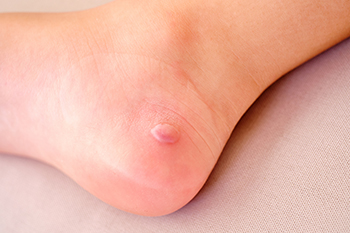April 2025
Heel Pain Can Be Treated!
Types of Blisters on the Feet

Blisters are fluid-filled sacs that form on the skin due to friction, heat, or cold. They commonly develop on the feet as the result of running, wearing ill-fitting shoes, or exposure to extreme temperatures. Blisters caused by friction typically appear as raised, clear bubbles of fluid on the skin, while those caused by heat or cold may be accompanied by redness, swelling, or pain. Symptoms include a painful, tender area where the skin has been damaged. Blisters from heat can occur from burns, while cold blisters may form due to frostbite or prolonged exposure to cold surfaces. The pain can range from mild to intense, especially when pressure is applied. A podiatrist can help by providing proper treatment, such as draining the blister, if necessary, dressing it to prevent infection, and advising on how to avoid future blisters. They can also offer guidance on selecting the right footwear. If you have painful blisters on the feet, it is suggested that you schedule an appointment with a podiatrist.
Blisters are prone to making everyday activities extremely uncomfortable. If your feet are hurting, contact Gregory T. Loo, DPM of Elite Podiatry. Our doctor can provide the care you need to keep you pain-free and on your feet.
Foot Blisters
Foot blisters develop as a result of constantly wearing tight or ill-fitting footwear. This happens due to the constant rubbing from the shoe, which can often lead to pain.
What Are Foot Blisters?
A foot blister is a small fluid-filled pocket that forms on the upper-most layer of the skin. Blisters are filled with clear fluid and can lead to blood drainage or pus if the area becomes infected.
How Do Blisters Form?
Blisters on the feet are often the result of constant friction of skin and material, usually by shoe rubbing. Walking in sandals, boots, or shoes that don’t fit properly for long periods of time can result in a blister. Having consistent foot moisture and humidity can easily lead to blister formation.
Prevention & Treatment
It is important to properly care for the affected area in order to prevent infection and ease the pain. Do not lance the blister and use a Band-Aid to provide pain relief. Also, be sure to keep your feet dry and wear proper fitting shoes. If you see blood or pus in a blister, seek assistance from a podiatrist.
If you have any questions, please feel free to contact one of our offices located in Ahwatukee, and Phoenix, AZ . We offer the newest diagnostic and treatment technologies for all your foot care needs.









